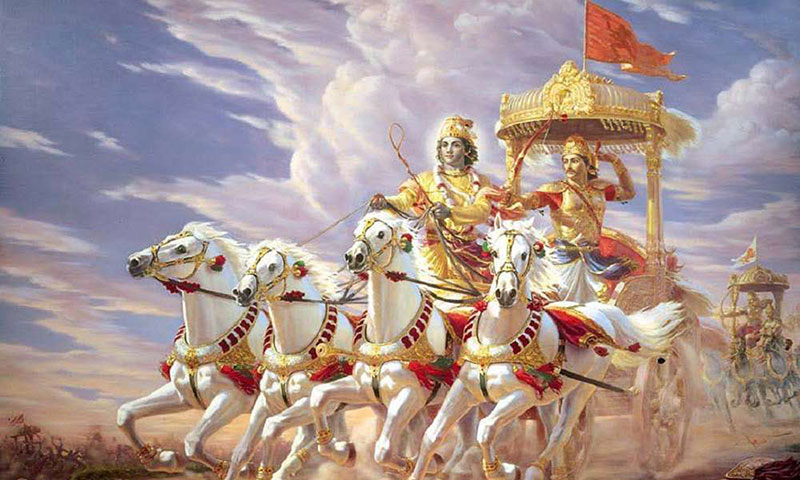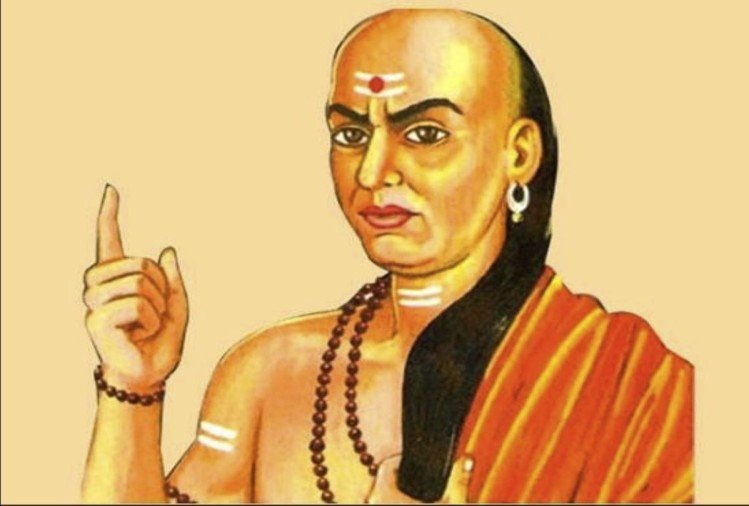Srimad Bhagawad Gita अर्जुनविषादयोगः अथ श्रीमद्भगवद्गीता अथ प्रथमोऽध्यायः अर्जुनविषादयोगः atha śrīmadbhagavadgītā atha prathamo’dhyāyaḥ arjunaviṣādayogaḥ
धृतराष्ट्र उवाच ।
धर्मक्षेत्रे कुरुक्षेत्रे समवेता युयुत्सवः ।
मामकाः पाण्डवाश्चैव किमकुर्वत सञ्जय ॥ १- १ ॥
Dhritarāshtra said:
Gathered on the holy plain of Kurukshetra, O Sanjaya, what did my sons and the sons of Pāndu, eager to fight, do?
सञ्जय उवाच ।
दृष्ट्वा तु पाण्डवानीकं व्यूढं दुर्योधनस्तदा ।
आचार्यमुपसंगम्य राजा वचनमब्रवीत् ॥ १- २ ॥
Sanjaya said:
Having seen the army of the sons of Pāndu arrayed, King Duryodhana then approached the preceptor (Drona), and spoke (these) words:
पश्यैतां पाण्डुपुत्राणामाचार्य महतीं चमूम् ।
व्यूढां द्रुपदपुत्रेण तव शिष्येण धीमता ॥ १- ३ ॥
Behold, O preceptor, this vast army of the Pāndavas arrayed by the son of Drupada, your gifted disciple.
अत्र शूरा महेष्वासा भीमार्जुनसमा युधि ।
युयुधानो विराटश्च द्रुपदश्च महारथः ॥ १- ४ ॥
अथ श्रीमद्भगवद्गीता अर्जुनविषादयोगः संपूर्ण रामायण पढ़ने के लिए यहां क्लिक करे
धृष्टकेतुश्चेकितानः काशिराजश्च वीर्यवान् ।
पुरुजित्कुन्तिभोजश्च शैब्यश्च नरपुंगवः ॥ १- ५ ॥
युधामन्युश्च विक्रान्त उत्तमौजाश्च वीर्यवान् ।
सौभद्रो द्रौपदेयाश्च सर्व एव महारथाः ॥ १- ६ ॥
Here are mighty –bowed heroes, equals of Bhima and Arjuna in battle – Yuyudhāna (Sātyaki), and Virāta and Drupada,
the mighty warrior.
Dhrishtaketu, Chekitāna, the valiant king of Kāsi, Purujit, Kuntibhoja and that prince amongst men, the king of the Shibis.
Yudhāmanyu the powerful, Uttamaujas the valiant, the son of Subhadrā, and the sons of Draupadi – all mighty warriors (Māharathāḥ).
अस्माकं तु विशिष्टा ये तान्निबोध द्विजोत्तम ।
नायका मम सैन्यस्य संज्ञार्थं तान्ब्रवीमि ते ॥ १- ७ ॥
Know also, O best amongst the twice-born (Brāhmanas), those who are distinguished amongst us, the leaders
of my army. I shall name them for your information.
भवान्भीष्मश्च कर्णश्च कृपश्च समितिञ्जयः ।
अश्वत्थामा विकर्णश्च सौमदत्तिस्तथैव च ॥ १- ८ ॥
Yourself, Bhishma, Karna and Kripa, the winner of battles; Asvatthāma, Vikarna and also the son of Somadatta.
अथ श्रीमद्भगवद्गीता अर्जुनविषादयोगः संपूर्ण रामायण पढ़ने के लिए यहां क्लिक करे
अन्ये च बहवः शूरा मदर्थे त्यक्तजीविताः ।
नानाशस्त्रप्रहरणाः सर्वे युद्धविशारदाः ॥ १- ९ ॥
And many other heroes as well are there, determined to give up their lives for my sake, wielding various (kinds
of) weapons for attack, all dexterous in battle.
अपर्याप्तं तदस्माकं बलं भीष्माभिरक्षितम् ।
पर्याप्तं त्विदमेतेषां बलं भीमाभिरक्षितम् ॥ १- १० ॥
That army of ours, protected by Bhishma, is insufficient; But this army of theirs, protected by Bhima, is sufficient.
अयनेषु च सर्वेषु यथाभागमवस्थिताः ।
भीष्ममेवाभिरक्षन्तु भवन्तः सर्व एव हि ॥ १- ११ ॥
(Therefore) do you all, keeping to your respective stations, at all approaches to the army, protect Bhishma alone on all sides.
तस्य सञ्जनयन्हर्षं कुरुवृद्धः पितामहः ।
िंहनादं विनद्योच्चैः शङ्खं दध्मौ प्रतापवान् ॥ १- १२ ॥
Gladdening his (Duryodana’s) heart, the powerful eldest of the Kurus, the grandsire, thundered forth a lion’s roar,
and blew his conch.
अथ श्रीमद्भगवद्गीता अर्जुनविषादयोगः संपूर्ण रामायण पढ़ने के लिए यहां क्लिक करे
ततः शङ्खाश्च भेर्यश्च पणवानकगोमुखाः ।
सहसैवाभ्यहन्यन्त स शब्दस्तुमुलोऽभवत् ॥ १- १३ ॥
Then, all of a sudden conchs, kettle-drums, trumpets, drums and horns blared forth; that sound was tumultuous.
ततः श्वेतैर्हयैर्युक्ते महति स्यन्दने स्थितौ ।
माधवः पाण्डवश्चैव दिव्यौ शङ्खौ प्रदध्मतुः ॥ १- १४ ॥
Then, seated in a great chariot to which white horses were yoked, Mādhava (Sri Krishna) and Pāndava (Arjuna)
blew their celestial conchs.
पाञ्चजन्यं हृषीकेशो देवदत्तं धनञ्जयः ।
पौण्ड्रं दध्मौ महाशङ्खं भीमकर्मा वृकोदरः ॥ १- १५ ॥
Hrishikesa (Krishna) blew the (conch) Pānchajanya, Dhananjaya (Arjuna) the Devadatta, and Vrikodara
(Bhima) of terrible deeds blew the great conch Paundra.
अनन्तविजयं राजा कुन्तीपुत्रो युधिष्ठिरः ।
नकुलः सहदेवश्च सुघोषमणिपुष्पकौ ॥ १- १६ ॥
King Yudhishthira, the son of Kunti blew the Anantavijaya and Nakula and Sahadeva, the Sughosha and Manipushpaka respectively.
काश्यश्च परमेष्वासः शिखण्डी च महारथः ।
धृष्टद्युम्नो विराटश्च सात्यकिश्चापराजितः ॥ १- १७ ॥
संपूर्ण रामायण पढ़ने के लिए यहां क्लिक करे
द्रुपदो द्रौपदेयाश्च सर्वशः पृथिवीपते ।
सौभद्रश्च महाबाहुः शङ्खान्दध्मुः पृथक्पृथक् ॥ १- १८ ॥
The Mighty-bowed king of Kāsi, the mighty warrior Sikhandi, Dhrishtadyumna, Virāta, the unconquered Sātyaki,
Drupada, the sons of Draupadi, and Subhadrā’s son of powerful arms, (all), O Lord of the earth, blew their respective conchs on all sides.
स घोषो धार्तराष्ट्राणां हृदयानि व्यदारयत् ।
नभश्च पृथिवीं चैव तुमुलोऽव्यनुनादयन् ॥ १- १९ ॥
The great tumult, making the heaven and earth resound, rent the hearts of Dhritarāshtra’s sons.
अथ व्यवस्थितान्दृष्ट्वा धार्तराष्ट्रान् कपिध्वजः ।
प्रवृत्ते शस्त्रसम्पाते धनुरुद्यम्य पाण्डवः ॥ १- २० ॥
हृषीकेशं तदा वाक्यमिदमाह महीपते ।
अर्जुन उवाच ।
सेनयोरुभयोर्मध्ये रथं स्थापय मेऽच्युत ॥ १- २१ ॥
अथ श्रीमद्भगवद्गीता अर्जुनविषादयोगः संपूर्ण रामायण पढ़ने के लिए यहां क्लिक करे
यावदेतान्निरीक्षेऽहं योद्धुकामानवस्थितान् ।
कैर्मया सह योद्धव्यमस्मिन् रणसमुद्यमे ॥ १- २२ ॥
Then the monkey-bannered son of Pāndu, (Arjuna) when he saw the sons of Dhritarāshtra (thus) arrayed, and when
missiles were about to be discharged, raised his bow, O king, and said to Hrishikesha (Sri Krishna) the following words:
Arjuna said:
O Achyuta, (Sri Krishna) keep my chariot between the two armies while I see those who are arrayed, seeking battle,
and know with whom I shall have to fight in this preparation for combat.
योत्स्यमानानवेक्षेऽहं य एतेऽत्र समागताः ।
धार्तराष्ट्रस्य दुर्बुद्धेर्युद्धे प्रियचिकीर्षवः ॥ १- २३ ॥
(And while) I see those who are gathered here ready for fight, desirous of pleasing in battle the evil-minded son of Dhritarāshtra.
सञ्जय उवाच । एवमुक्तो हृषीकेशो गुडाकेशेन भारत ।
सेनयोरुभयोर्मध्ये स्थापयित्वा रथोत्तमम् ॥ १- २४ ॥
भीष्मद्रोणप्रमुखतः सर्वेषां च महीक्षिताम् ।
उवाच पार्थ पश्यैतान्समवेतान्कुरूनिति ॥ १- २५ ॥
Sanjaya said:
O descendant of Bharata (Dhritarāshtra), thus spoken to by Gudākesa (Arjuna), Hrishikesa (Sri Krishna),
placing that excellent chariot between the two armies, in front of Bhishma, Drona, and all the kings, said, “See, O son of Prithā (Arjuna), these assembled Kurus.”
तत्रापश्यत्स्थितान्पार्थः पितॄनथ पितामहान् ।
आचार्यान्मातुलान्भ्रातॄन्पुत्रान्पौत्रान्सखींस्तथा ॥ १- २६ ॥
There, situated in both the armies, Pārtha (Arjuna) saw fathers, as also grandsires, preceptors, maternal uncles,
brothers, sons, grandsons, associates, fathers-in-law, and well-wishers.
अथ श्रीमद्भगवद्गीता अर्जुनविषादयोगः संपूर्ण रामायण पढ़ने के लिए यहां क्लिक करे
श्वशुरान्सुहृदश्चैव सेनयोरुभयोरपि ।
तान्समीक्ष्य स कौन्तेयः सर्वान्बन्धूनवस्थितान् ॥ १- २७ ॥
Seeing all these kinsmen gathered together , the son of Kunti, overcome with great compassion, spoke thus in grief.
कृपया परयाविष्टो विषीदन्निदमब्रवीत् ।
अर्जुन उवाच ।
दृष्ट्वेमं स्वजनं कृष्ण युयुत्सुं समुपस्थितम् ॥ १- २८ ॥
Arjuna said:
Seeing these kinsmen, O Krishna, arrayed with a view to fighting, my limbs fail, and my mouth is parched up.
सीदन्ति मम गात्राणि मुखं च परिशुष्यति ।
वेपथुश्च शरीरे मे रोमहर्षश्च जायते ॥ १- २९ ॥
My body quivers, and there is horripilation; the Gāndiva (Arjuna’s bow) slips from my hands, and my skin burns.
गाण्डीवं स्रंसते हस्तात्त्वक्चैव परिदह्यते ।
न च शक्नोम्यवस्थातुं भ्रमतीव च मे मनः ॥ १- ३० ॥
I am not able to stand, my mind is reeling, as it were, and I see, O Keshava (Sri Krishna), adverse omens.
निमित्तानि च पश्यामि विपरीतानि केशव ।
न च श्रेयोऽनुपश्यामि हत्वा स्वजनमाहवे ॥ १- ३१ ॥
न काङ्क्षे विजयं कृष्ण न च राज्यं सुखानि च ।
किं नो राज्येन गोविन्द किं भोगैर्जीवितेन वा ॥ १- ३२ ॥
संपूर्ण रामायण पढ़ने के लिए यहां क्लिक करे
येषामर्थे काङ्क्षितं नो राज्यं भोगाः सुखानि च ।
त इमेऽवस्थिता युद्धे प्राणांस्त्यक्त्वा धनानि च ॥ १- ३३ ॥
आचार्याः पितरः पुत्रास्तथैव च पितामहाः ।
मातुलाः श्वशुराः पौत्राः श्यालाः सम्बन्धिनस्तथा ॥ १- ३४ ॥
And I see no good from killing kinsmen in battle. I do not desire victory, O Krishna, nor sovereignty, nor pleasures;
of what use is sovereignty to us, O Govinda (Sri Krishna), or enjoyments, or life itself?
They for whose sake we desire sovereignty, enjoyments and pleasures, are gathered here for battle, giving up
(their) lives and wealth.
Preceptors, fathers, sons, as also grandsires; maternal uncles, fathers-in-law, grandsons , brothers-in-law, and
other kinsmen as well.
एतान्न हन्तुमिच्छामि घ्नतोऽपि मधुसूदन ।
अपि त्रैलोक्यराज्यस्य हेतोः किं नु महीकृते ॥ १- ३५ ॥
I do not like to kill them, O Madhusudana (Sri Krishna), even if they should kill us, no, not even for the sovereignty
of the three worlds, much less for that of this earth.
अथ श्रीमद्भगवद्गीता अर्जुनविषादयोगः संपूर्ण रामायण पढ़ने के लिए यहां क्लिक करे
निहत्य धार्तराष्ट्रान्नः का प्रीतिः स्याज्जनार्दन ।
पापमेवाश्रयेदस्मान्हत्वैतानाततायिनः ॥ १- ३६ ॥
What joy will be ours, O Janārdana (Sri Krishna) , by slaying these sons of Dhritarāshtra? Sin alone will overtake
us if we kill these aggressors.
तस्मान्नार्हा वयं हन्तुं धार्तराष्ट्रान्स्वबान्धवान् ।
स्वजनं हि कथं हत्वा सुखिनः स्याम माधव ॥ १- ३७ ॥
Therefor we ought not to kill these sons of Dhritarāshtra, our kinsmen; how can we indeed be happy, O Mādhava (Sri Krishna), by killing our own people?
यद्यप्येते न पश्यन्ति लोभोपहतचेतसः ।
कुलक्षयकृतं दोषं मित्रद्रोहे च पातकम् ॥ १- ३८ ॥
कथं न ज्ञेयमस्माभिः पापादस्मान्निवर्तितुम् ।
कुलक्षयकृतं दोषं प्रपश्यद्भिर्जनार्दन ॥ १- ३९ ॥
Although these, with their minds overcome by greed, see no evil in destroying the family or sin in hostility to friends,
why should we, O Janārdana, who see the evil resulting from destruction of the family, not learn to desist from this sin?
कुलक्षये प्रणश्यन्ति कुलधर्माः सनातनाः ।
धर्मे नष्टे कुलं कृत्स्नमधर्मोऽभिभवत्युत ॥ १- ४० ॥
With the destruction of the family the time-honoured family traditions are lost; and when the traditions are lost,
unrighteousness overtakes the whole family.
संपूर्ण रामायण पढ़ने के लिए यहां क्लिक करे
अधर्माभिभवात्कृष्ण प्रदुष्यन्ति कुलस्त्रियः ।
स्त्रीषु दुष्टासु वार्ष्णेय जायते वर्णसङ्करः ॥ १- ४१ ॥
When unrighteousness prevails, O Krishna, the women of the family become corrupt, and when the women are corrupt,
O descendant of the Vrishnis (Krishna), there arises a mixture of castes.
सङ्करो नरकायैव कुलघ्नानां कुलस्य च ।
पतन्ति पितरो ह्येषां लुप्तपिण्डोदकक्रियाः ॥ १- ४२ ॥
The mixture of castes in the family only leads its destroyers to hell; their ancestors fall (from heaven), for they are
deprived of the offerings of funeral cakes and drink.
दोषैरेतैः कुलघ्नानां वर्णसङ्करकारकैः ।
उत्साद्यन्ते जातिधर्माः कुलधर्माश्च शाश्वताः ॥ १- ४३ ॥
From these sins of the destroyers of the family that lead to a mixture of castes, the long –standing traditions of the
caste, the family, etc. are destroyed.
उत्सन्नकुलधर्माणां मनुष्याणां जनार्दन ।
नरके नियतं वासो भवतीत्यनुशुश्रुम ॥ १- ४४ ॥
Persons whose family traditions are destroyed, O Janārdana, are doomed to live perpetually in hell; thus have we heard.
अहो बत महत्पापं कर्तुं व्यवसिता वयम् ।
यद्राज्यसुखलोभेन हन्तुं स्वजनमुद्यताः ॥ १- ४५ ॥
Alas, what a heinous sin we are resolved to commit, in that we are ready to kill our kinsmen, out of greed for the joys of sovereignty.
यदि मामप्रतीकारमशस्त्रं शस्त्रपाणयः ।
धार्तराष्ट्रा रणे हन्युस्तन्मे क्षेमतरं भवेत् ॥ १- ४६ ॥
If the sons of Dhritarāshtra with weapons in (their) hands should slay me in battle, while I am unarmed
and unresisting, that would be better for me.
सञ्जय उवाच ।
एवमुक्त्वार्जुनः सङ्ख्ये रथोपस्थ उपाविशत् ।
विसृज्य सशरं चापं शोकसंविग्नमानसः ॥ १- ४७ ॥
Sanjaya said:
Thus speaking, Arjuna sat down on the chariot in (that) battle, casting away (his) bow and arrows, being
grief-stricken at heart.
ॐ तत्सदिति श्रीमद्भगवद्गीतासूपनिषत्सु
ब्रह्मविद्यायां योगशास्त्रे श्रीकृष्णार्जुनसंवादे
अर्जुनविषादयोगो नाम प्रथमोऽध्यायः ॥ १ ॥



